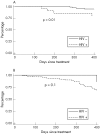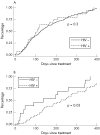Serological response to syphilis treatment in HIV-positive and HIV-negative patients attending sexually transmitted diseases clinics
- PMID: 16943224
- PMCID: PMC2598600
- DOI: 10.1136/sti.2006.021402
Serological response to syphilis treatment in HIV-positive and HIV-negative patients attending sexually transmitted diseases clinics
Abstract
Background: HIV-positive patients treated for syphilis may be at increased risk for serological failure.
Objective: To compare follow-up serologies and serological responses to treatment between HIV-positive and HIV-negative patients attending two sexually transmitted disease (STD) clinics.
Study design: Existing records were reviewed from HIV-positive patients who were diagnosed and treated for syphilis at the public STD clinics in Baltimore, Maryland, USA, between 1992 and 2000. Results of their serological follow-up were compared with those of HIV-negative clinic patients at the time of syphilis treatment. Failure was defined as lack of a fourfold drop in rapid plasma reagin (RPR) titre by 400 days after treatment or a fourfold increased titre between 30 and 400 days.
Results: Of the 450 HIV-positive patients with syphilis, 288 (64%) did not have documented follow-up serologies and 129 (28.5%) met the inclusion criteria; 168 (17%) of 1000 known HIV-negative patients were similarly eligible. There were 22 failures in the HIV-positive group and 5 in the HIV-negative group (p<0.001). The median times to successful serological responses in both groups were 278 (95% confidence interval (CI) 209 to 350) and 126 (95% CI 108 to 157) days, respectively (p<0.001). A multivariate Cox's proportional hazards model showed an increased risk of serological failure among the HIV-positive patients (hazards ratio 6.0, 95% CI 1.5 to 23.9; p = 0.01).
Conclusion: HIV-positive patients treated for syphilis may be at higher risk of serological failure. Despite recommendations for more frequent serological follow-up, most patients did not have documentation of serological response after standard treatment for syphilis.
Conflict of interest statement
Competing interests: None.
References
-
- Blocker M E, Levine W C, St Louis M E. HIV prevalence in patients with syphilis, United States. Sex Transm Dis 20002753–59. - PubMed
Publication types
MeSH terms
Substances
Grants and funding
LinkOut - more resources
Full Text Sources
Medical
Research Materials
Miscellaneous


